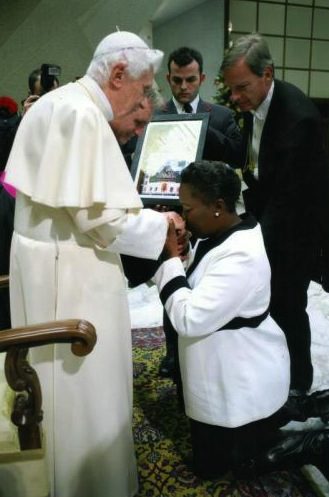But regardless, a brilliant modern case of this obedience of language to its culture is seen in the French curse “Tabernac!”, derived from ‘tabernacle’. (As in: “Tabernac! Les zombies est dans l’ecole!”.) Widely and colorfully in use not 50 years ago, there are places in French Canada where the word is going extinct. The reason is simple. In an ever-secularizing France, no one knows what they are blaspheming any more. We Americans are a little better off, but let’s be honest; outside of our retention of ‘goddammit’ we’re hardly a blasphemous people. Now we – along with the rest of the modern world – say ‘f*ck’.
And I, personally, don’t think it’s any radical improvement, and I certainly don’t think it’s in any way bold, for all its diverse application. When a man blasphemes he is at least – at some basic, pagan level – being bold. Spitting in the eye of the Almighty takes some gall. And in doing so, he never denies the existence of God; he is always open to conversion, if only in the vague acknowledgment of someone greater than he to curse.
But let us skip through the centuries to our Unblasphemous Age; our curses consist of the brave and daring crying out of basic biological functions, as if they were some horrendous actions that our grandmothers never performed. Though there are a few glorious outliers, our ‘bad’ vocabulary consists almost entirely of renaming excretion, urination, sex, and body parts. (That is not to say none of these words existed – sh*t has been around for a while – just that none of them were used as they are now; as curses.) These ‘renamed functions’ don’t exactly insult anyone, and they certainly don’t shake verbal fists at the Almighty. They are, for all practical purposes, rather weak. It may be too much of a stretch to say that we curse in the Age of Darwin; it is the the biological acts that we reverence enough to blaspheme, while we are too distant from Our Lord to stone him with a verbal rock. It is not too much to say that our four-letter words are pathetic excuses for blasphemy.
That’s the whole problem with modern vulgarity. It’s not that it says too much, it’s that it says so frightfully little. Perhaps you thought that I was going to write about that. Oh, my dear Patheos, ye have much to learn. Off the spring-board and to the point then:
If our culture and language do indeed have a marital relationship – as seen in our curses -how does our language account for our culture’s current and blatant adultery with relativism, that stupid idea that there exists no absolutes? I hold that our language reflects this idiocy in our embarrassingly awkward use of replacement words. I apologize to members of an older, more literate generation; perhaps you are not as exposed to the phenomenon of the middle-school girl, green and pink braces shining, informing the world that her boyfriend is, “like, so nice, you know? I mean he’s, like, the greatest guy you’ve ever met in the whole universe!” (That wasn’t satire, unfortunately.) For all you public school graduates; you know. The words of our relativistic culture reveal a timidity, a fear of absolutes, a cowardice over the prospect of committing oneself to a statement, perfectly mirroring our modern philosophy that shamedfacedly raises a hand and says, “What’s true for you isn’t true for me, so let’s all just get along.”
As an example, we have the widespread use of the phrase “I feel like” replacing the assertion “I think that”. This is particularly rampant within modern Christianity – “I feel like God’s calling me to break up with you”, “I feel like God doesn’t care about what you wear to church” – but it is as often used to preface everyday statements – “I feel like we should leave, those clouds look ominous”, “I feel like we should run, that zombie has a knife”. What does this dubious bit of slang do to our sentences? It emasculates them. No one can be blamed for a feeling, no one can be held accountable for it. Feelings are subjective. They are relative. No one can argue with the person who ‘feels like’ gays should be free to marry, any more than argue with the man who feels like a turtle. It is unarguable because it is insane. Intentionally or not, the widespread use of this preface fits right alongside our cultures liaison with relativism; it avoids the absolute in favor of the vague. It avoids the responsibility of a thought in favor of the helplessness of an emotion. Thus it is left to grumpy, stodgy, sarcatholic old men to call out this culture of wimps: “What, you feel like our government should help us? What kind of feeling is that? Does it make your spine tingle, that government-should-help-us feeling?” An on and thus forth, until their victim breaks down in tears, converts to a liturgical denominations, and takes grammar classes from a nun. (Which, in case you’ve haven’t noticed yet, I need.)
The sugaring of our language with the word ‘like’ is similarly relativistic. Besides the fact that it’s thrown into sentences with an anarchistic view towards the existence of intelligibility or the well-being of one’s neighbor, it performs the greater evil of making every statement a simile. “We, like, had no idea how to operate the shotgun.” This can only imply that the speaker’s lack of idea is simply ‘like’ something else. Again, the absolute is avoided. Or, in an alternative usage, we see it as a replacement for ‘said’: “I was like, we should just drop it and run.” No longer are we accountable for what we say, only for what we are like, and who on earth could blame us for something so vague?
Or take the delightful phrase, “you know?” This – of all our replacement words – is the most pitiful. It begs for agreement. It demands affirmation. It is a spoiled, little brat. “I got bitten, you know? And there wasn’t much I could do after that, you know?” One must assume that if the listener was to say, “No, in fact, I don’t know.” the speaker’s claim would be null and void. But the question is not really a question at all. It is a whine. It seeks validation of its speaker, not through the strength of the speaker’s content, but by the agreement of the listener. “You know” is the Unitarian of replacement words: “All we all happy? Alright, great.”
I maintain that it’s no accident that there is a stronger aversion to these words in Catholic circles than in others. It is because these words – intentionally or not – reflect our Great Foe: the tyranny of relativism. Language follows culture. God make haste the day when our culture might have the strength to be wed to a language devoid of cowardly interjections, a language that “lets our ‘yes’ mean yes and our ‘no’ mean no.”












